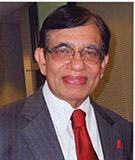
ACC Convention: Orlando 2018
Snapshots of Recent Advances in Cardiology: Part I

The rapid advances taking place in the field of cardiovascular medicine (CV) never cease to amaze me. Several fresh drugs for the treatment of heart failure, hypertension, diabetes mellitus and high cholesterol are already available and more on the way. New lab tests and innovative procedures are helping the patients considerably. In fact, this rapid pace of change is likely to accelerate in future. The main discussion in this year’s Annual Scientific Session of American College of Cardiology (ACC) in Orlando (March 9-11) that I attended essentially centered on “What’s ahead in our journey in CV Medicine?” There was indeed a lot to learn for the practicing physician.
Orlando certainly was the place for the world’s premier cardiologists, researchers and practicing physicians to come together to engage with the latest in science and innovation and interact with one another. Simon Dack Lecture, one of the key presentations every year, was given by Professor Nanette Kass Wenger, MACC, a pioneer in CV Medicine, who talked about ‘heart disease in women.’ Heart disease is still the leading cause of morbidity and mortality in women. There seem to be significant gender differences in the abnormal processes (pathophysiology) associated with the disease and presentations can be different. A common complaint is that women are treated less aggressively than their male counterpart. Dr. Wenger also emphasized that comprehensive understanding of the hormonal and genomic basis for these differences of the disease and special symptoms in women is key to providing gender-specific care.
An important multicenter trial presented was “ODYSSEY outcomes” in which several thousand patients from many countries that had an acute cardiac event were studied. They still had inadequately controlled bad cholesterol (LDL – C) levels of > 77 mg, even after treatment with statin drugs; hence, they were given a new drug called PCSK9 inhibitor (alirocumab – repatha etc). This further reduced the LDL – C and that was translated into a significant reduction in future adverse cardiac events. Because of the benefit in mortality level and preservation of life, these new class of drugs are already becoming popular as an adjuvant to statin therapy or as a sole therapy by itself. Reducing the serum LDL is still one of the most important treatment and preventive measure for coronary heart disease and statistics suggest “lower the LDL (definitely below 75) the better.”
Advanced heart failure, a major problem for the practicing physician and a common cause for repeat hospitalizations (for which insurance companies penalize doctors) and mortality, was discussed at length. At this stage of the disease, medicine alone will not improve the condition much; hence, a Left ventricular assist device (LVAD) is used. It effectively strengthens pumping of the heart. Once considered a bridge therapy for cardiac transplantation, it is now used for long-term support of the heart failure patient. Reoperations and strokes were common with the older versions of LVADs but the “Momentum 3” trial showed that a new generation LVAD, ‘Heart Mate 3 LVAD,’ significantly reduced the disabling strokes.
The two growing modern epidemics that feed on each other are Type 2 Diabetes (T2DM) and Heart Failure (HF). This is a deadly intersection and what every clinician must know how to manage these two diseases effectively was the focus of the Eugene Braunwald Lecture. The most common CV complication of T2DM is HF and the new class of drugs called SGLT -2 inhibitors such as Jardiance, Invokana and Farxiga can substantially reduce the risk of developing HF.
On the lighter side: ‘The [email protected] Studio’ in the exhibit hall conducted many novel community-centered events and competitions like “FIT Jeopardy, Cardiology Contest, Family Feud, Quiz Bowl,’ etc., and attracted a lot of participants. This gave a chance to many young cardiologists to compete actively and win prizes. Needless to say, content of all the games was current cardiology research, testing and management.
The reason cardiologists and ancillary care team (nurses, technicians, etc.) flock toward the annual ACC Convention is that it continues to set standards for lifelong learning for the entire cardiovascular care team. From my training days onward, these annual conventions have provided me with the best evidence-based and practical education in my specialty.
To be continued …
M.P. Ravindra Nathan, M.D., is a cardiologist and Emeritus Editor of AAPI Journal. His book “Stories from My Heart” was recently released. (www.amazon.com or www.bn.com).